Dr. Chandra Bhandari, a youth leader and central committee member of the Nepali Congress (NC) is studious and a minute observer of the politics and political changes everywhere.
Here are the excerpts of the interview Khabarhub had had with Dr. Bhandari on various issues ranging from now widely-debated Millennium Challenge Corporation, the prevalent tug-of-war for power in Nepali Congress, the role of an opposition party, and the fate of democracy both at national and international context.
Nepali Congress, the main opposition party, now seems to be in a crisis. Senior leaders have been divided. Around 45 ‘disappointed’ district chairs held a meeting in Kathmandu without the party President’s consent. This indicates that the party is on the verge of split. As an influential youth leader, how do you analyze this development?
If we peek into the past, there are instances of intra-party differences or dissenting forces forging consensus or even alliance following serious discussions.
As the saying goes, a truth is ascertained after going through a series of discussions. In other words, serious discussions over a subject will bring all warring factions together by realizing the truth. This, in fact. is the essence of democracy.
If we boycott the meeting or if we don’t take part in the discussion, we avoid democratic norms and values. A party has to be operated as per its norms and values.
Our party seems to lack three things: Firstly, some people who are close to the President, irrespective the party constitution, seem committed to capturing the party. Secondly, there are few leaders ready to disregard the party constitution provided they get the share as per their bargain, and thirdly, there are few who believe that party president should abide by the party constitution.
What’s the condition? Is the party president abiding by the party constitution?
The President has failed to abide by the party constitution. As the party chair, it’s up to him to ensure fair and free elections. This implies to the general convention as well. There has to be a unanimous voice within the party.
Secondly, two months after the general convention the President should fulfill the vacant post at various departments. Nominating in the vacant posts in coming February is against the party statute. I would label this as unethical and immoral.
Thirdly, the constitution has the provision of making 28 departments, and the party President is trying to make it 48, which, too, is against the statute. He should refrain from taking such steps. To be precise, he (Deuba) has started the trend of not holding the general convention of the party’s sister organizations.
The assembly of the district chairs is the outcome of such persistent disregard of the party constitution. However, the party chairs were so responsible that they made all leaders agree that none should go against the party statute.
But the meeting was not called by any legally authorized body.
Indeed, it was a meeting called by the disgruntled faction of the party to thrash out intra-party differences. I was in Gulmi then, and after I came back to Kathmandu, I called the chairpersons of both factions. We met party President Sher Bahadur Deuba and senior leader Ram Chandra Paudel to make clear their respective positions. Both leaders shared the weaknesses and lapses of the past. An appreciated move, indeed!
Will it resolve the dispute then? Will the leadership address it?
Yes, we are confident that they will address the ongoing dispute between the top leaders of the party.
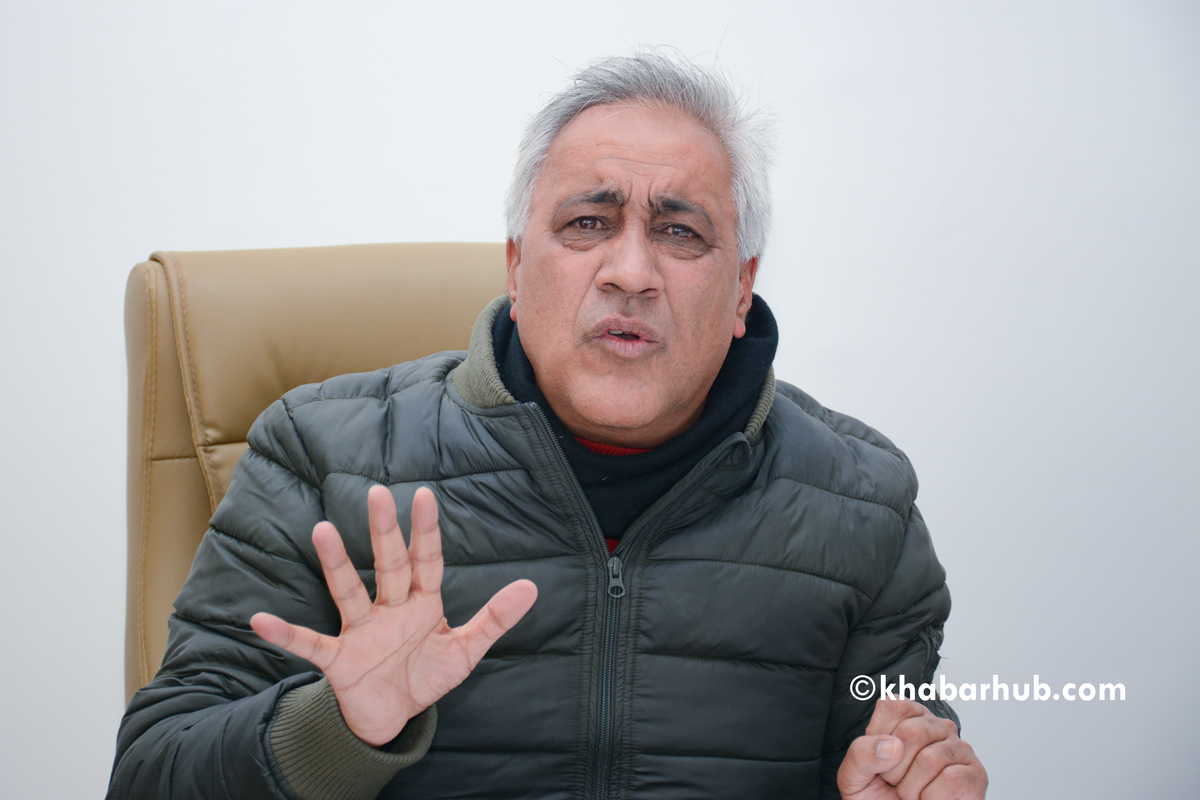
What if not? The party establishment has already declared the date for the general convention. The senior leaders are turning deaf ears to one another. You were not in the meeting that announced the date for the convention? The party seems to be at the point of the split, isn’t it?
Firstly, let me clarify that Nepali Congress will not split. Everyone is used to the pains and pangs of the split. Surely, some greater change is likely to take in the way the party is governed. Not only in the change of leadership, but there also be a transformation of leadership.
Change of leadership can’t solve the agenda, it’s high time that the leadership is transformed. There will be a lot of homework and discussion for the transformation of the party leadership. That will eliminate the possibility of the split for good.
Transfer of leadership will take to handing the leadership to the aspiring septuagenarians in the party. Do you mean transfer or transform of leadership?
I mean transformation, not transfer of reins. The cause of Nepal’s backwardness is leadership. The failure to hand over the leadership properly.
There are two types of sanyasis or yogis: one in maroon or let’s say yogic robes; they live in small hut known as kuti, provided they abide by what they are taught, their purpose of life is to share the knowledge, they can’t beg alms from more than five households in a day.
The other type is that of leaders, I mean political leaders. They are expected to serve the nation. Neither the sanyasis or Rishis nor the political leaders have realized what their role comprises of. Ironically, both the sanyasis and the leaders are focused on accumulating wealth and make palaces.
This is rampant all political parties. That’s why, I concluded that leadership change does not suffice, transform of the leadership is a must. This is the course for us to follow.
What Kejariwal, despite the power giants like Modi and Amit Shah’s opposition, did in India in 3-4 years, we failed to do in 30 years. Neither the king nor the political parties could prove their strength and competence in 30 years. That’s what made me conclude that we definitely need a change in the leadership. That’s possible only through the transformation of leadership.
You talked about leadership. How will it be addressed then? Will it be addressed after the general assembly?
The tenure is to expire in the coming February, the convention is rescheduled for one year after. That’s the optimum point our party can function constitutionally. Provided a disaster or some unforeseen circumstances occur our party itself will be void, or bed-ridden. We have to assume that our leadership won’t be irresponsible and unconscientious to the point of leading the ‘termination’ of the party itself.
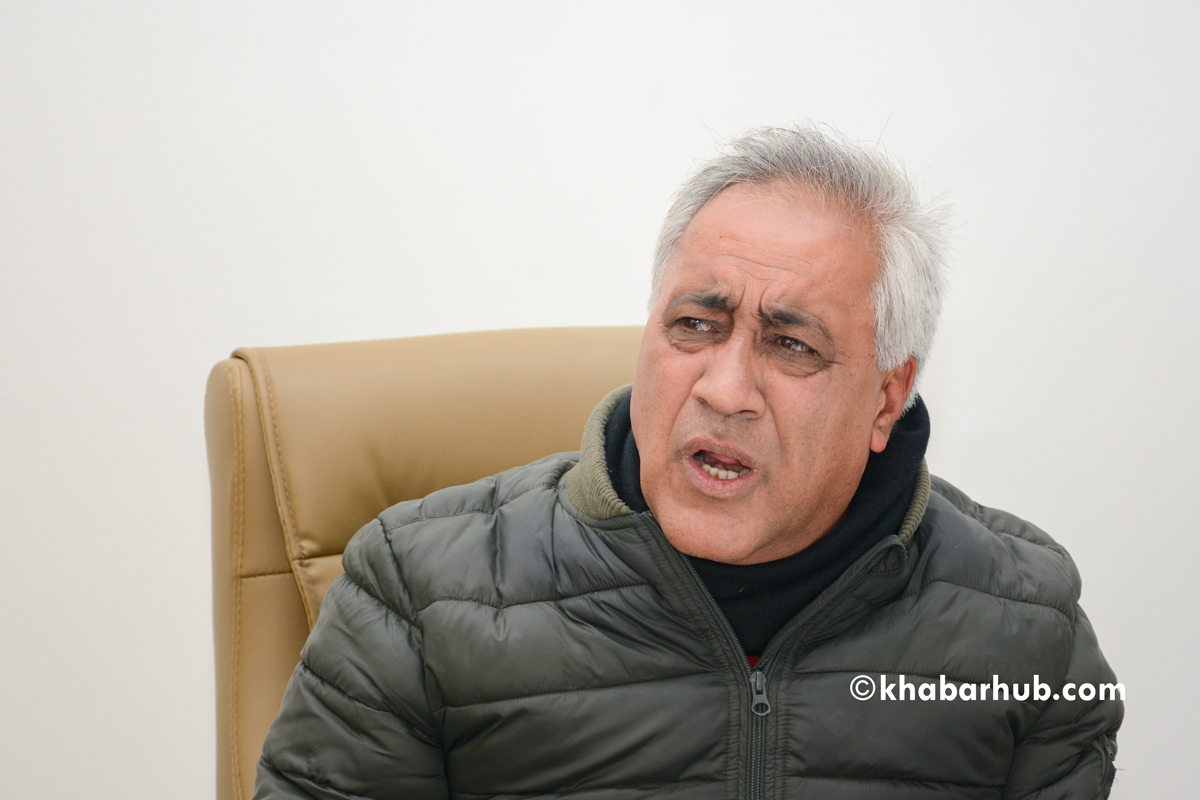
It appears, there is no abiding by democratic norms and values in the party. How can you call your party democratic then?
It’s a human nature that to look at it from a sociological point of view. When a person gets older, he/she goes from macro to micro-level squeezing the interests to a small nepotistic circle. In other words, the ideals about the public, communal, national or let’s say humanitarian interests get narrowed down to the best interests of the closest kith or kin. Our party also became subject to the same.
Nepali Congress has a glorious history, the history of eliminating the authoritarian Rana regime to the end of the party-less Panchayat system. Why is the party so weak and helpless so as to fail to execute the responsibilities of the opposition party in the parliament? How can you tempt the aspiring youths to the party?
It’s the party of BP Koirala, a leader who never gave up when his voice was conspiringly defeated in the referendum held in May 1980.
Despite being under pressure from India and China, he put the nation first and staked his life. It’s the party led by Shubarna Shumsher, who facilitated the implementation of the land reform system in Nepal offering 16,000 bigha of his land to the state.
Ganesh Man, the Supremo of the 1990 movement against the autocratic party-less Panchayat who refused to take the premiership valuing the party chair first. Kishunji’s saintly politics is ideal for all aspiring politicians. Our glorious history can’t be shadowed by some transitory hurdles at present.
The leadership has to realize its glory and work in harmony with the glorious past. NC’s failure may lead to the failure of the nation. It is to be realized.
We have got the opportunity to take the party out of this crisis. So the conscious leaders have to work for it. The dying sensitivity has to be revived and we should feel the pain at the border encroachment, people being deceitfully fed on the pesticides. We unanimously passed a resolution against inundation, border encroachment, but the government has failed to act. We have an agenda, we have to work for it.
Why is the parliament unable to discuss and address the agenda of the public? The brain-drain, youth-drain isn’t it painful?
The parliament should have been made the platform to discuss such issues. Yes, our inability to act a responsible opposition, the parliament has turned a place to validate corruption. Despite their majority, if we had succeeded in unveiling the corrupt face of the government, we could have got more support and appreciation. Something is lacking. While confessing the weaknesses the leadership has realized such issues. We are optimistic.
Millennium Challenge Corporation grant already accepted by Nepali Congress is in dispute now. This 500 million project to operate on the US grant and to be handled by the mechanism headed by MCA-Nepal, a desk under Ministry of Finance has gathered many clouds these days especially due to the diverse voices coming from the ruling Nepal Communist Party. Why do you think such disputes occur?
It is a nature of the Nepali communists to dispute on unnecessary topics. Thirty-seven years before, we went for the deal to construct Arun Hydropower in grant. Had that happened, Nepal’s fate would have changed affirmatively. Ironically, the communists of Nepal who boast of their ‘anti-Indian’ identity surrendered the same project to India after 35 years that is two years before. Isn’t this serious?
But for Province-4, people of all provinces use Narayan-Mugling-Kathmandu route. Had we made Kathmandu- Hetauda road wider or had we expanded the BP Highway, how fast could we come to Kathmandu? How it would narrow down the gap between Pahadis and Madhesis!
Billions are spent to give life to Muglin, which is sparsely populated. The poor fate of the nation, no leadership paid attention to it. They listened to the handful influencing people surrogating the Narayangarh-Mugling-Kathmandu route for their interest, and the nation suffered.
Now, when the border encroachment from India is jeering the public when people are asking for being united for the nation; just to divert the issue and veil their shallowness the ruling party and its leaders are making MCC grant an issue.
It is shameful to the party leaders. The communists are using the dispute on the grant to veil their hypocrisy.
The MCC grant is not a loan, it is a grant. This mega project is focused on infrastructure building of Nepal, and is focused on a specified area of transmission line expansion and road network improvement. If there are some flaws, let’s discuss the issue seriously; otherwise using it to make lame excuses to divert the attention of the public is irrational and insensitive to the leaders.
Do these leaders want to retain their rule exporting the youths to the risky job market of gulf countries? This is foolish for them to think that people will excuse them later.
When China promised to give 54 billion, we are enthralled; but we waived off 60 billion to N-Cell. See how much is waived off for Yeti Group; the government has assented to pay 22 billion to the machinery worth 6 billion; oh, it is shameful!
How can we get such a mega project in 5 years? How can the government which is unable to patch the ditches of Kathmandu, or the government unable to finish the Melamchi project started a decade before? How can the government that can’t save the border speak on such an issue?
Even the group the communists are trying to appease has green signaled for the grant by saying that it does not seem to have a military alliance.
Concern should have been for China and India as well. Even the Chinese ambassador has said that if it does not have any military alliance included, it is good for Nepal, Nepal can take it.
More than what others say, we have to look for our interest, we should not think much on behalf of anyone else; our view is clear as it is in the best interest of Nepal, it should be accepted and taken ahead.
Ironically, the persons seeking the embassy facilitation to get this or that portfolio or even the election expenses are talking about ‘nationality’ and sovereignty. They have long terminated sovereignty they talk about.
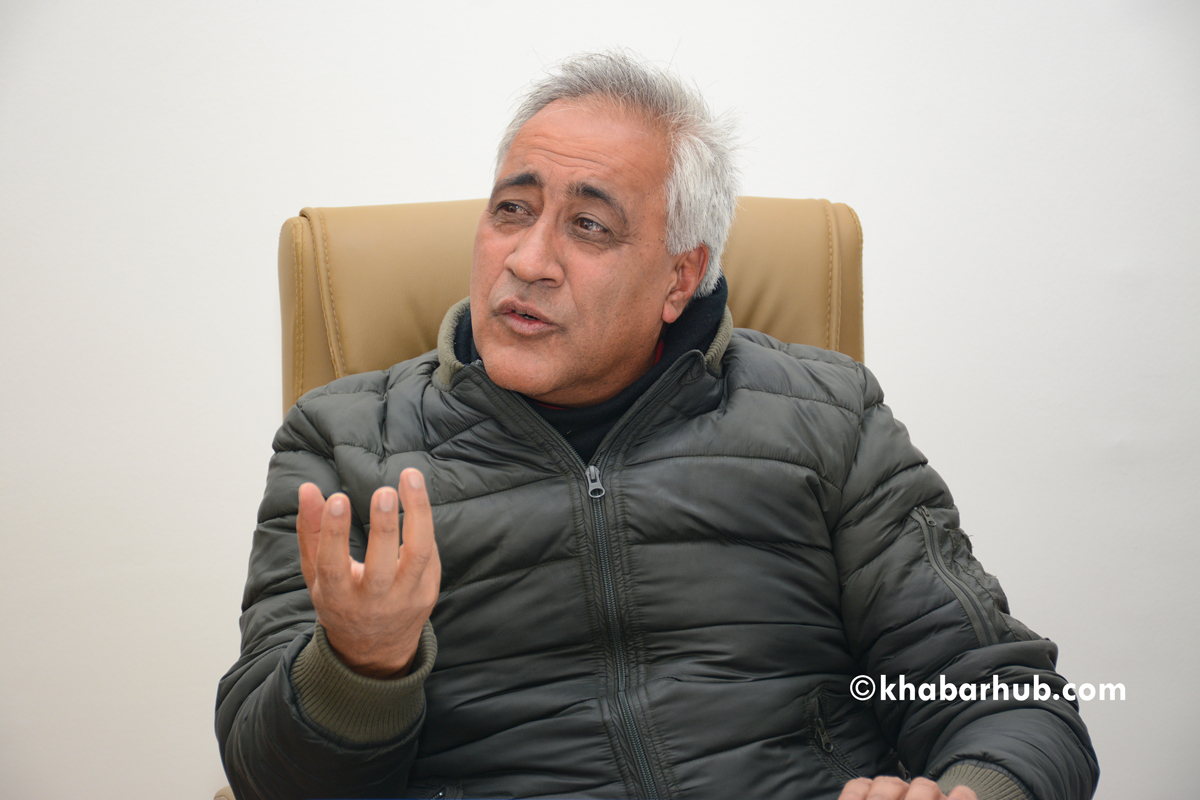
The abuse of national property, Wide Body corruption, gold trafficking, Nepal Trust’s property abuse, etc. there are so many cases of mess everywhere, where is the opposition in these issues?
Each day starts with the news of corruption and accident. The thoughtful minds are often stressed with these things.
Communists have got nearly a twp-third majority. KP Oli, a leader who had gone through hardship for political change, is the Prime Minister of the country and has all power to bail out the country from this impasse.
Provided the communists fail the situation, they will be confined to the state of their fellows in West Bengal India.
There had never been so many cases of corruption in the past. Unfortunately, the Nepali Congress failed to take leadership against it.
However, our party President has stood in rostrum demanding the action against the corruption. NC has said that it was with the government provided it goes for the national interest as in Kalapani case. It is what we have done.
Yes, we fall in an ethical trap sometimes as we talk about the consent of the majority in the party and defy the majority’s decision of the ruling party in the parliament.
We are striving hard to end indecisively in the party and go united against corruption and mess in the country.
People hint at the inefficiency of leadership to raise serious issues. Have you seen the possibility of the new generation succeeding the old ones now in your party?
I don’t want to make any comment insulting the leaders who sacrificed their happiness for the best interest of the party and the nation. However, the leadership lacks the efficiency to tackle the issues the country has to deal with these days.
What’s the way out now when the government is corrupt and the opposition is inefficient? There is no third alternative power. How can democracy survive?
You raised a serious question both theoretically and realistically too. Many philosophers opine that democracy is dead now. Thinkers like Steven Levitsky have written a lot showing how democracy is at stake. I think there is a recession on democracy. Few philosophers think there has to be a new line for democracy. Now, the most important organs of democracy legislature, executive and judiciary are losing faith.
Leadership is the most important aspect of democracy. Unfortunately, the driver, the leadership of democracy is indulged in petty personal interests. They forget that their corruption is weakening people’s trust in them, which ultimately won’t spare them as well.
Now, Nepal’s facing the same crisis. If Nepali Congress does not work for it, a serious accident may take place.
Don’t you see that more than democracy, the ‘nationalist’ interest is staking the ideals of democracy? Be it be the case of the USA, UK, Russia, India, etc. democracy does not seem appealing anymore? How do you take it?
It is an important question. Humans are destructive by nature. Society, religion, law, constitution all are the attempts to curb its destructive nature. We are brought here through the various system this first thing. Secondly, the demography of this world is shifting. People are shifting to the place they find more facilities.
In the case of Nepal, people have gone down to terai from hills, and abroad from terai. Out of the 30 million population, more than half is outside the country. Turkey alone has more than 4 million migrants. The UK has sought Brexit to avoid the migration problem. President Trump of the USA is talking about making border walls to prevent the inflow of migrants. In our neighborhood India, Mamta Banerjee has now u-turned and is asking for the citizenship of 4 million Bangali people.
These show that the world has gone for conservative nationalism. The ‘global village’ concept is replaced by this conservative nationalism. Our present scenario also reflects the same. The terai is suspicious of the hills and the hills from the mountains.
Now China has started a social credit system. China has now suggested going for investment in social value education. Now the world seems to be seeking alternatives to a democratic system. To drive the new world, the world should go for religious communism, that can offer people daily wages.
To address the challenges democracy each nation is highlighting the strengthening the national infrastructure.
The world is divided into these two poles. The leadership that should have been conscious about it is lost in petty interest, which can lead neither the parties nor the nations ahead unless they change it all. So, I talked about the political transformation in the nation.


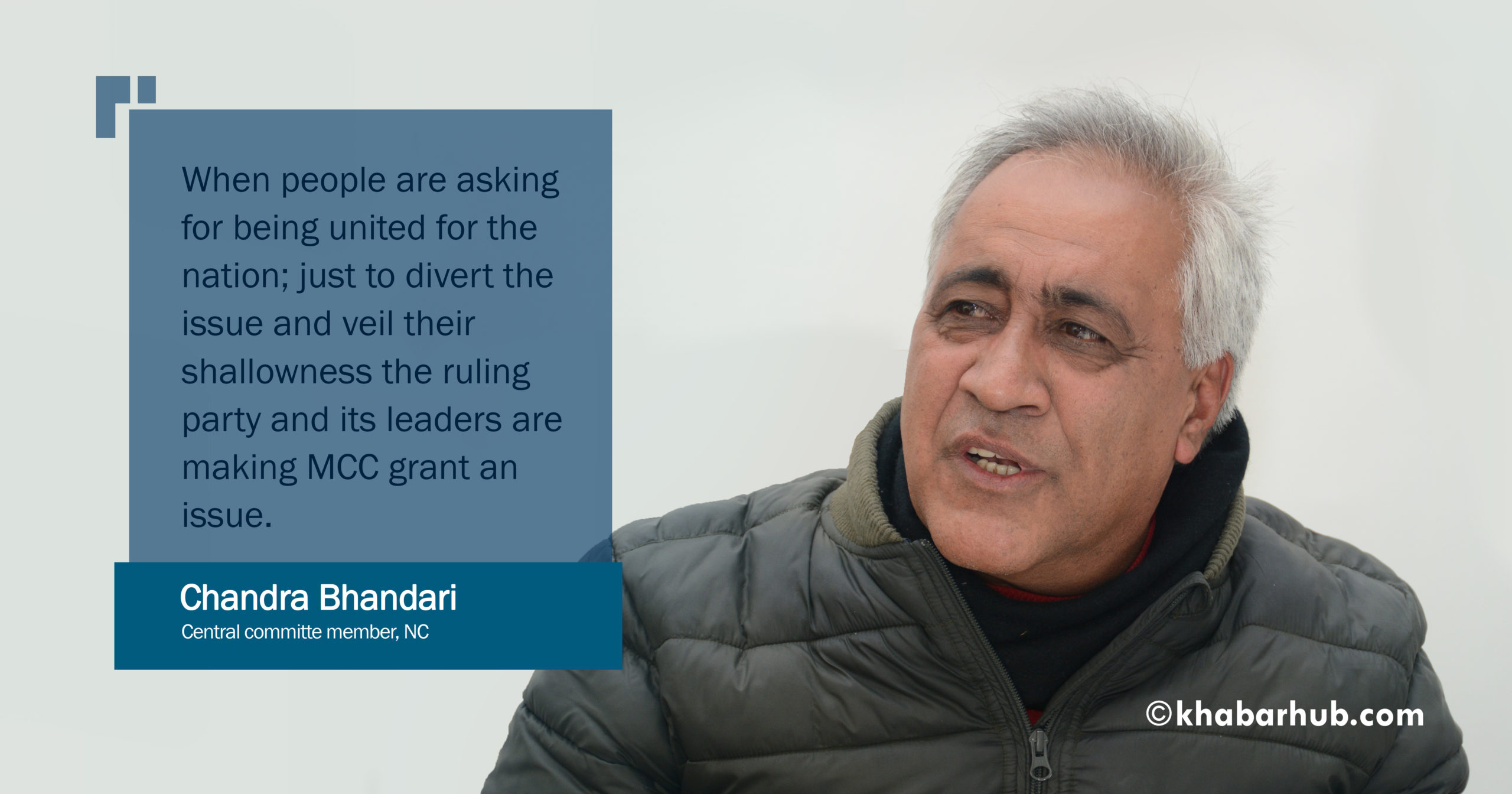


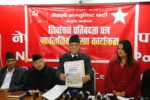

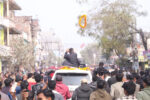

Comment